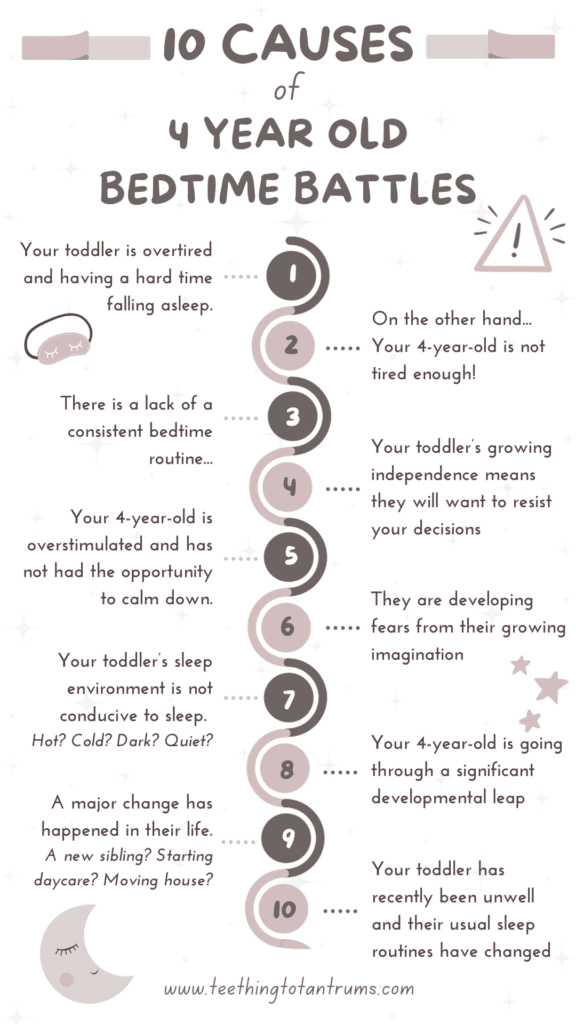Ok, I’ll say it… There is nothing worse than a toddler fighting sleep at night. After a busy day, all you want is to have a few hours of peace to recharge your batteries for tomorrow. But 4-year-old bedtime battles can put a stop to even the best bedtime routines.
So what can you do? How can you end toddler sleep resistance? How can you help your little one fall asleep quickly, easily, and tantrum-free? Read on to find out.

Table of Contents
10 Causes Of 4-Year-Old Bedtime Battles
When your child fights sleep, bedtime can be a challenging time for you both. Nobody wants to be battling with their little one at the end of the day.
But to stop 4-year-old bedtime tantrums, you must understand why they happen in the first place.
After 40+ years in the childcare industry, here are the top reasons I have found why your toddler is resisting sleep and throwing a bedtime tantrum:

- Overtiredness: A tired 4-year-old is more likely to be irritable and difficult at bedtime and will have a hard time settling down to sleep. This is because when your child gets overtired, their body produces the hormones cortisol and adrenaline to keep them awake. Unfortunately, this has the undesired effect of making it incredibly hard to get your toddler to sleep when they need it most. If your child seems to be fighting you to go to sleep at bedtime, try moving their bedtime back by 15-30 minutes.
- Not Tired Enough: On the other hand, if your child is not tired enough, it can trigger 4-year-old bedtime battles too. This can be a difficult balance to find, so the key is to establish how much sleep your child has had in the last 24 hours. If they are getting enough sleep, ensure your child is getting outside and having enough physical activity during the day.
- Lack Of A Consistent Bedtime Routine: If you don’t have an established bedtime routine that happens at the same time every day, your 4-year-old is more likely to derail bedtime and not stick to the plan. This is because a consistent bedtime routine will create a sleep-conducive environment and lay down clear rules and boundaries about sleep.
- Growing Independence: 4-year-olds are often developing a sense of independence and may resist going to bed as a way of asserting their autonomy. Try giving your child choices within the bedtime routine to help them feel more in control. I like to do this by offering two options for pajamas or bedtime books and letting the 4-year-old choose which to wear and read.
- Overstimulation: Too much stimulation before bedtime can make it difficult for children to wind down. Limit screen time in the lead-up to bedtime and engage in calming activities before bed to reduce hyper behavior and stop bedtime battles.
- Fears: Some children may experience fears or anxieties around bedtime. Fears can often present themselves in tantrum-like behavior. Addressing these fears with empathy and reassurance can help your 4-year-old feel more secure. Fear of monsters or the dark is a very common fear for this age group so consider using a night light or leaving the door open to help alleviate these fears. Reading books about their specific fear can also help and promote conversation (I will share my favorites later in the article).
- Sleep Environment: Your child’s sleep environment can also impact their ability to fall asleep and stay asleep. Think about how you like your room… Is it cold? Dark? Is there a fan on? Your child will have preferences too. To limit 4-year-old bedtime battles make sure their room is quiet, dark, and at a comfortable temperature.
- Developmental Milestones: Sometimes, developmental milestones can disrupt a child’s sleep patterns. For example, if your child is learning a new skill like not wearing a diaper at night, they may have more accidents at night. As a result, your toddler might be hesitant to sleep because they don’t want to make a mess.
- Change in circumstances: This is a very common cause of bedtime tantrums in 4-year-olds. If you have moved home, returned to work, a new baby has arrived, or they have started pre-school, then you will need to be patient and supportive as they adapt to the new situation. Having a recognizable bedtime routine and ensuring your 4-year-old is getting enough sleep will be essential at this time.
- Illness: If your 4-year-old has been unwell and their bedtime and nighttime routine has changed as a result (such as sleeping in your bed or you being more tolerant about their night wakings) they may struggle to go back to the normal routine once they are better. After all, sleeping alongside Mum and Dad is the best!
NOTE: Children with ADHD may have difficulty settling down at bedtime. ADHD behaviors are hard to identify in toddlers, but by 4 years old, some patterns of behavior may indicate your child has ADHD. If you suspect your child may have ADHD, talk to your doctor.
If you’re really struggling with daily bedtime battles, check out my Bedtime Battles Masterclass to reclaim the calm evenings you well and truly deserve.
Discover How To Create Stress-Free Bedtimes & Peaceful Daytime Naps, Consistently...
Without Tears, Tantrums or Showdowns
✅ Your parenting superpower to unlock calm evenings for years to come! 😌
✅ How to craft a calm and consistent bedtime routine that will get your little one falling in love with sleep… 🛌
✅ Uncover the techniques that the famous “Norland Nannies" use so you can get your little one going to bed and staying there! 🎉
✅ The secret to ending nighttime waking… to ensure your little one is getting enough sleep to thrive and reach their full potential! ❤️
✅ A super simple trick you can use to end hyperactivity before bed … so your little one will happily go to bed when you want them to 🌟
How To Avoid 4-Year-Old Bedtime Battles
Dealing with 4-year-old bedtime battles can be tough. But by understanding the possible causes of your child’s bedtime tantrums will help you develop a strategy to address them.
If you have been able to identify triggers for 4-year-old bedtime battles, here’s how you can stop them in their tracks (and prevent these nighttime tantrums from happening ever again).
1. Understand Your 4-Year-Olds Sleep Needs
As children grow, their sleep needs change. Your 4-year-old will need between 10 and 13 hours of sleep per day, however, they may not need a nap every day.
Instead, I recommend having some quiet time after lunch to help your 4-year-old recharge their batteries. Keep an eye on your child’s behavior and adjust their sleep schedule accordingly.
2. Establish A Consistent Sleep Schedule
Following on from my last point, children of all ages thrive on routine, so it’s essential to establish a regular sleep schedule. Try to keep bedtime and wake-up time consistent, even on weekends.
Also, if your child does have a bedtime tantrum, it’s essential to be consistent with your consequences. Make it clear that this behavior is not acceptable and that bedtime means bedtime.
3. Avoid Screens Before Bedtime
Avoiding screens before bed is one of my biggest parenting teachings. It has been proven that the blue light from electronic devices interferes with sleep, so I always advocate avoiding screens for at least an hour before bedtime.
Instead, encourage your little one to do calm activities like reading a book, coloring, or assembling a puzzle.
These classic 24-piece wooden puzzles are easy to grasp, lift and fit together to create bright scenes of the ocean, being on safari and walking among dinosaurs! Perfect for a quiet afternoon toddler activity, these puzzles will be a wonderful addition to any toy box.
4. Create A Calm Consistent Bedtime Routine
A consistent calm bedtime routine can help your child wind down and prepare for sleep. Include a warm bath and reading a story together in the bedtime routine.
I always found that using audio stories was a great way to settle my son during the toddler years. This is because audiobooks give your little one something to focus on and will more often than not result in them falling asleep.
There are lots of free resources for children’s audiobooks and YouTube is best. I have also found the Dreams website contains a collection of fabulous bedtime stories, which you can access here: 9 Audio Bedtime Stories for Kids from Dreams.
5. Make Their Bedroom Cozy And Comfortable
A comfortable sleep environment can help your child feel safe and relaxed. Make sure their room is dark and quiet, and that your toddler is dressed appropriately for the room’s temperature.
Consider using a white noise machine or blackout curtains to help your toddler sleep more deeply too.
White noise machines are a game-changer for your little one's sleep and having one that plays all night is a must. With a long-lasting battery, this compact and stylish white noise machine contains 21 non-stop relaxing noises, which will lull your little one to sleep night after night, no matter where you are!
6. Address Your Toddler’s Fears
From the fear of the dark to starting preschool, or the arrival of a new sibling, there are books out there that can help you communicate with your 4-year-old about what might be causing their bedtime tantrums.
Here are a few of my favorites:
- Franklin in the Dark By Paulette Bourgeois (fear of the dark)
- You’re the Biggest By Lucy Tapper and Steve Wilson (the arrival of a sibling)
- Bye Bye Time By Elizabeth Verdick (separation anxiety)
- The Berenstain Bears’ Moving Day By Stan Berenstain (moving house)
- The Owl Who Was Afraid Of The Dark By Jill Tomlinson (fear of the dark)
- How to Catch a Monster By Adam Wallace (scared of monsters)
- The Boy with Big, Big Feelings By Britney Winn Lee (handling big emotions and separation anxiety)
Fear of the dark and monsters in the cupboard or under the bed are common at this age and can easily cause issues at bedtime. Take time to talk about your child’s specific fear, look under the bed, and check dark corners to allay their fears.
Using a night light and keeping the door open to a lit corridor can also help your 4-year-old feel safe.
Finding the right night light for your child can be quite a task. You want something safe, comforting, and practical. The Cozy Starry Night Light ticks these boxes, with eye-friendly warm lighting and an easy-to-use dimmer.
Its gentle glow makes it the best night light for feeding baby, diaper changes, or comforting your little one back to sleep.
As your baby grows the Cozy Starry Night Light's starry sky projection can provide comfort and gentle quiet time stimulation. Its soft lighting ensures a dreamy, peaceful environment, supporting your baby’s natural sleep cycle.
It really is a fantastic nightlight (at a very reasonable price!)
- Eye-friendly warm lighting with adjustable brightness.
- Includes a timer function for convenience.
- Projects a starry sky that is soothing for little ones.
- Rechargeable battery, so it's very portable.
- A USB adapter is not included for charging.
- The star projector is static without motion (however, this is ideal for very young babies and toddlers).
- Battery life varies based on the brightness settings.
TOP TIP: I like to create a monster spray to help with fears of monsters. Simply fill a spray bottle with water and a handful of beads and sequins and spray it around the room to eliminate any hidden monsters. You can also add a few drops of calming essential oils (like lavender, camomile, or cedarwood) to strengthen the illusion.
7. Use A Toddler Alarm Clock
If your 4-year-old is waking up during the night or early in the morning using a toddler alarm clock can indicate to them when it is appropriate to get up and when it is not.
This is particularly useful because a toddler who wakes up too early may get overtired when bedtime comes back around.
MELLA is the #1 most backed kid's clock and all-in-one Ready to Rise children's sleep trainer designed to keep your kid in bed longer. MELLA is a sleep trainer, alarm clock, sleep sounds machine, night light and nap timer rolled into one adorable package!
Studies show that children do not fully understand the concept of time until around 8 years old, so MELLA uses colours and facial expressions to teach your kid when it's time for bed and when it's okay to wake up. With MELLA, your kid can learn to stay in bed longer, giving you more sleep!
8. Reduce Separation Anxiety
It’s essential to understand that anxiety is a very common factor in 4-year-old bedtime battles.
Separation anxiety, for instance, can make your child feel worried about being left in their room alone, and recognizing and empathizing with their fears will make it easier to address the issue.
One effective strategy for managing anxiety is to develop calming rituals to help ease your child’s anxiety such as deep breathing.
There are lots of resources on the internet to help your child learn how to deep breathe. Here’s one I love from Moshi Kids on YouTube:
NOTE: MoshiKids has a downloadable app full of hundreds of hours of bedtime stories, sleep sounds, educational activities, songs, and white noise tracks. However, at $12.99 a month, it’s completely up to you whether you think it’s a worthwhile purchase. Whilst it has amazing reviews, you can find plenty of FREE resources on YouTube if you prefer!
9. Encourage Independence
At this age, children are eager to assert their independence. Give your child some control over their bedtime routine by allowing them to choose their pajamas and the bedtime story.
If you are struggling with a particularly defiant child at bedtime, read this post to help you handle a strong-willed child.
10. Offer Incentives For Good Behavior
Positive reinforcement can be a very effective tool for encouraging good behavior.
Use a sticker chart and offer an incentive like doing a favorite activity together the following day if they have gone to bed peacefully and stayed in bed all night.
Motivate your little ones with this fantastic magnetic reward chart. This colorful and vibrant chart features adorable safari animals and comes with 18 different chore magnets so you can personalize it to your routines. Fully interactive and adaptable, your bedtimes will never stall again!
Looking to get your little one to sleep quickly and effortlessly through a healthy nighttime routine? Check out my Bedtime and Nap Cheat Sheet and master the art of making daytime naps and bedtimes as seamless as possible.
A bedtime & nap cheat sheet so good your little one will ask you to put them to bed...
Laura Williams "This is a life saver! I'm so glad I downloaded your bedtime & nap cheat sheet. My little one actually asked me to put him to bed last night! Unbelievable! Thank you so much!"
Click Here For The FREE Cheat Sheet
Bedtime Routine To Avoid Tantrums
As I mentioned earlier, establishing a consistent bedtime routine is crucial in helping your 4-year-old avoid bedtime tantrums.
A daily pattern will help your little one know what to expect, which can reduce anxiety and stress (the leading triggers of tantrums).
To nail the bedtime routine, follow these tips:
- Start the run-up to bedtime after the last meal of the day. Begin with some quiet play before bath time.
- Handle transitions calmly and with plenty of warnings by repeatedly letting your toddler know that the bedtime routine is coming up.
- Include a warm bath and reading a book in the routine as this will signal to your child that it’s time for sleep, help them calm down, and make the transition to bedtime far smoother.
- It is essential that you remain present throughout the whole bedtime process and do not become distracted by looking at your phone or doing other chores.
- Avoid screen time close to bedtime, as it can negatively impact your child’s sleep. Encourage quiet activities like coloring or puzzles instead.
- Play an audiobook story to help your 4-year-old settle once you have said goodnight
- Finally, be patient and understanding. Changes in sleep patterns may take time, but consistency and a supportive routine can lead to improved bedtime experiences and reduced tantrums.
REMEMBER: Focus on creating a positive and supportive environment, and be mindful of your child’s emotional well-being. Always encourage open communication, validate their feelings, and ensure they understand that their fears are acknowledged and respected.
Remember, if you’re really struggling with daily bedtime battles, check out my Bedtime Battles Masterclass to reclaim the calm evenings you deserve.
Discover How To Create Stress-Free Bedtimes & Peaceful Daytime Naps, Consistently...
Without Tears, Tantrums or Showdowns
✅ Your parenting superpower to unlock calm evenings for years to come! 😌
✅ How to craft a calm and consistent bedtime routine that will get your little one falling in love with sleep… 🛌
✅ Uncover the techniques that the famous “Norland Nannies" use so you can get your little one going to bed and staying there! 🎉
✅ The secret to ending nighttime waking… to ensure your little one is getting enough sleep to thrive and reach their full potential! ❤️
✅ A super simple trick you can use to end hyperactivity before bed … so your little one will happily go to bed when you want them to 🌟
When To Consult A Professional About Bedtime Tantrums
If, despite your best efforts, your child’s sleep problems are affecting their daily life, causing stress for the whole family, and have been going on for more than 2 weeks, it is time to consider seeking professional help.
One option is to consult a sleep training expert or sleep consultant. They can guide the development of a consistent bedtime routine and implement strategies for better sleep habits.
They can also help address any underlying issues that may be contributing to your child’s sleep difficulties.
Another option is to talk to your child’s pediatrician. They can assess your child’s overall health and development, and provide recommendations for improving their sleep habits. They may also be able to refer you to a specialist if necessary.
If your child has siblings, it’s also important to consider their sleep needs too. Siblings sharing a room can sometimes disrupt each other’s sleep, leading to more bedtime battles.
Frequently Asked Questions About 4-Year-Old Bedtime Battles?
Looking for more information about why your 4-year-old refuses to sleep and is throwing tantrums at bedtime? Here are the answers to the most commonly asked questions.
Q: What are some common reasons why a 4-year-old may resist bedtime?
A: There are several reasons why a 4-year-old may resist bedtime. Some common reasons include not having a consistent bedtime routine, feeling anxious or scared, wanting to spend more time with parents, a big change in routine, or simply not feeling tired.
Q: Why is my 4-year-old acting out at bedtime?
A: Your 4-year-old may be acting out at bedtime because they are trying to assert their independence or because they are feeling anxious or scared. It’s important to stay calm and patient and to try to understand what is causing their behavior.
Q: What are some effective strategies for dealing with bedtime battles?
A: Some effective strategies for dealing with bedtime battles include establishing a consistent bedtime routine, setting clear expectations and boundaries, providing comfort and reassurance, and avoiding stimulating activities before bedtime.
Q: How much sleep does a 4-year-old need each night?
A: Most 4-year-olds need about 10-13 hours of sleep each night. However, every child is different, so it’s important to pay attention to your child’s individual sleep needs, sleep cues, and wake windows and adjust their bedtime accordingly.
Q: At what time should I aim to have my 4-year-old in bed?
A: I recommended that 4-year-olds go to bed between 7 pm and 8 pm. However, the exact bedtime will depend on your child’s individual sleep needs and your family’s schedule. However, no child should be going to bed after 8.30 pm.
Q: Do 4-year-olds have sleep regressions?
A: Yes, 4-year-olds can experience sleep regressions. These may be caused by changes in routine, developmental milestones, or other factors. It’s important to stay patient and consistent with your child’s bedtime routine during these times.
Q: How can I help my 4-year-old with separation anxiety at night?
A: To help your 4-year-old with separation anxiety at night, you can try providing comfort items like a favorite stuffed animal, reading a calming story together, or using a night light. It’s also important to establish a consistent bedtime routine and to provide reassurance and support.
Need More Parenting Help?
- Download our FREE Bedtime & Nap Sleep Cheat Sheet. It’s a free, easy-to-use and proven formula designed for parents of 0-5 year olds to master the art of consistently undisturbed and restful sleep without the yelling, nagging or exhausting long-winded evenings.
- Check out our Parenting Toolbox. You’ll get access to expertly-chosen products that you can guarantee are the best for your little one and your wallet.
- Are you looking for personalized guidance to navigate the challenges of parenting? I offer 1-on-1 consultations to bring you tailored strategies and actionable advice to help support your child's growth and well-being with confidence.

A bedtime & nap cheat sheet so good your little one will ask you to put them to bed...
Laura Williams "This is a life saver! I'm so glad I downloaded your bedtime & nap cheat sheet. My little one actually asked me to put him to bed last night! Unbelievable! Thank you so much!"
Click Here For The FREE Cheat Sheet








